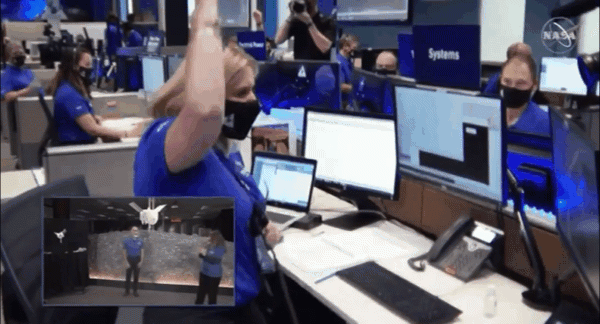| | 🥕 This is a really, really good time to go Organic. 🥕
But we're not thinking of food right now. We're thinking of traffic.
Because that delicious, processed traffic from advertisers like Facebook is getting less effective and more expensive... and it hurts. Now, more than ever, it's essential that you learn how to grow your own traffic from an "organic" source like Google Search. Google brings all the traffic. You just need to bring a straw a strategy for attracting that glorious search traffic onto your site and into your life. The perfect tool (and the gift that keeps on giving) is called an SEO Magnet.Russ has been building magnets real good for years. He's sucked millions of visitors from Google down to his and his client's pages... and starting tomorrow at 10am ET, he'll teach you how to do it in full detail.
Today is your last chance to save $200 and get full lifetime access to the workshop and materials. Remember, it's recorded! |
|
| | | | | Today: surprising sales surges simply from streamlined SEO, Google's bridge between breadth and brainpower, and asteroid mining vs. The Animatrix.
But first...
|
|
| | | "Tesla should really be thought of as roughly a dozen technology startups, many of which have little to no correlation with traditional automotive companies."
💬 Elon Musk describing his unusual way of seeing Tesla's operations. This type of paradigm might not work well in every business, but it does make sense when you take into account (A) the relative lack of precedent for many of Tesla's technologies and (B) Tesla's high level of vertical integration.
Musk didn't stop to provide the exhaustive list, but some of the 'internal startups' he mentioned were Autonomy (e.g. self-driving tech), Chip Design, Vehicle Service, Vehicle Sales, Motors, and the Supercharger Network. This also doesn't take into account how some of these technologies (like high-capacity batteries) can be used outside of Tesla. More from TechCrunch.
|
|
| | | | | RENT YOURSELF a MOVIE LITTLE THEATER: While they're still around, right? Even if you've not already heard, you probably won't be surprised that movie theaters have taken a big, BIG hit this year due to the pandemic. (How big? Umm, well, their Q2 revenues for this year were 98% lower than Q2 of last year. Gulp.) Having said that, it should surprise nobody that theaters are hankerin' for cash; AMC's new idea to let you rent your own theater for a private screening with up to 20 people. If nothing else, you could call this a safety-in-Groupon-numbers way of seeing movies on the big screen again—but the nifty and different thing is that you're not limited to what's already in circulation when you rent a theater. (You can request older movies too!) Price-wise, you're looking at $100-300 for the room depending on the size, location, and movie screened; there's also a flat $250 fee to bring in outside food, but at least then you can go as crazy as you want and no need to sneak.
SEO ROI FTW: Sorry. We had to do it. When the topic is 'how to calculate ROI from your SEO activities', it's just begging for a third acronym. Anyhow, on topic, MarketingProfs published this article from Ryan Jackson yesterday and it's a pretty decent overview for its (curt) length. You could go very deep into the weeds for either subject (ROI or SEO) alone, not to mention the intersection of the two—but he underscores an important digital-marketing principle we've mentioned recently, which is that some of this is just math. His more specific point is that small optimizations can have surprisingly large returns, the sort which he's able to illustrate with simple back-of-envelope math towards the bottom.
R.I.P. Quibi (2020-2020): It's official: Quibi has bitten the dust. Founder Jeffrey Katzenberg made the announcement yesterday after trying (in vain) to find a buyer last month, which was Month Five of the company's history. So there are a number of Quibi zingers bouncing around the web right now, and that's to be expected: this is one of the more spectacular failures in recent history, from the standpoints of both technology and business, and hindsight only makes it seem more obviously spectacular. But without trying to rub any personal salt in JK's wounds, the fact that Quibi had its immense resources (including his talent and connections) and its promising creative partnerships and it still flopped so hard means that the original idea just wasn't that good.
As this article from AdWeek more or less points out, Quibi was a solution to a non-existent problem; people didn't need a provider for short-form, mobile-native content because that's already how we consume tons of media. Still, we saw a few articles throwing Quibi a bone or even giving them props; to summarize the overall sentiment, at least Quibi tried hard and failed fast and we can move on with our lives now.
|
|
| | | | | | | Just to be clear: all search engines have indexes. We specify Google in this article only because it's tidier in print and easier to picture.
Anyways... why does Google's index exist? What problem does an index solve for a search engine?
In a sentence: the index makes Google's job (and the speed at which it does it) computationally possible. Google has to scour the complete public contents of the internet while trying to algorithmically read your mind—and it has to do all of that work in a split second. That simply wouldn't be possible if Google had to re-scan the whole internet for every single search query; it's way too much data to review all at once from scratch. So instead of reactively scanning the whole web for each new query, Google is always proactively scanning (or "crawling") the web for new and updated pages.
Picture the internet's complete contents as a gigantic textbook (or Google Doc); you could then think of Google's index as the "notebook" where it keeps its own up-to-date notes on the same information. The textbook does contain all of the complete detail, but the notebook will be much faster for finding any info again that Google has had a chance to review before.
The index bridges the gap between (A) Google's technological ability to access all of the internet's public information and (B) Google's algorithmic ability to satisfy search intent after parsing that information. Instead of scanning the whole internet from scratch every time, for each individual query, Google simply reviews the latest version of its notes for the information it had recorded (and updated) before you had ever searched for anything.
One last thing for today: you might've inferred this, but indexing is Google's process for reviewing a web page and "taking notes" while storing it in their database. The main reason webmasters care about Google's indexing of things is that web pages (or their updates) can't be found in Google Search until those pages have been (re-)indexed.
Tomorrow, we'll follow this up with the topic we'd originally intended for today: what mobile-first indexing is and why it's misunderstood these days. |
|
| | | | | First commercially-accessible 3G network
— OR —
First mass-market netbooks
(in the current, generic sense of the term) |
|
| Answer at the bottom of this email. |
|
| | | | | First Flight of the Osiris-Rex |
|
| NASA managed to pull off some exciting stuff this week — and yet, when we saw the name of their spacecraft for doing it, we got some serious Matrix déjà vu (but we'll get to that in a minute).
NASA pulled an Armaggedon and managed to land a probe called the Osiris-Rex on an asteroid. Unlike the crappy Bruce Willis movie, they weren't trying to blow up the asteroid with a nuke... their actual goal (collecting dust/rock samples) sounds much more boring.
Not that you'd think it's boring watching the Mission Control Happy Dance: |
|
| | | The Osiris-Rex touched down and grabbed stuff in six seconds or less, but it was a pretty dramatic-looking six seconds (and apparently the craft took it like a champ and managed rougher terrain than it was designed for). More here from CNET.
As for our Matrix déjà vu... let's just say that The Animatrix was (pound for pound) easily the best of the Matrix sequels, and opener "Final Flight of the Osiris" was a frickin' incredible work of animation (especially for 2003). |
|
| | | Premium Workshops from theCLIKK
- Lead Generation Mastery: Predictably build an email list of qualified prospects for B2B or B2C sales [Registration Fee: $295]
- Email Newsletter Mastery: How to Plan, Launch, and Virally Grow an Email Newsletter that Nurtures Leads and Drives Sales [Registration Fee: $295]
|
|
|
| 'WHICH CAME FIRST?' ANSWER: First commercial 3G network.
No doubt you've heard lots of talk these days (if mostly on TV commercials) about the advent of 5G networks. In case you didn't know, the G just stands for "Generation," so 5G is the fifth generation of wireless-telecom data-transfer infrastructure.
3G was a big deal in its own day, too—but that was quite some time ago, because the first commercial 3G networks went live in 2002, first in South Korea in January and then in the USA by July.
As for netbooks, we're looking at 2007 and, more specifically, the introduction of the Asus Eee PC. There were devices called "netbooks" before then, but not in the generic sense of the term we use now; the Eee PC was designed for an emerging mobile-friendly market which didn't exist prior to that point and started surging the following year, in 2008.
Just for the good of the record: the main characteristics of a 'netbook' are small size and light weight, wireless access to the internet, and the longest possible battery life—all at the expense of computing power and even then-standard peripherals like optical drives.
|
|
| ADVERTISE // LICENSE OUR CONTENT // SUBSCRIBE
Copyright ©2020 Modern Publisher, LLC. All rights reserved.
538 S. Main St. Columbia, IL 62236
Love today's issue of theCLIKK? Hate it? Reply to this email and let us know. We're listening.
Some links are affiliate links. This means that if you sign up or buy something we might make a commission. That said, we only link to things we believe are beneficial to you, the reader. Pinky promise.
Issues? Email support@theclikk.com |
|
|
|
|





No comments:
Post a Comment